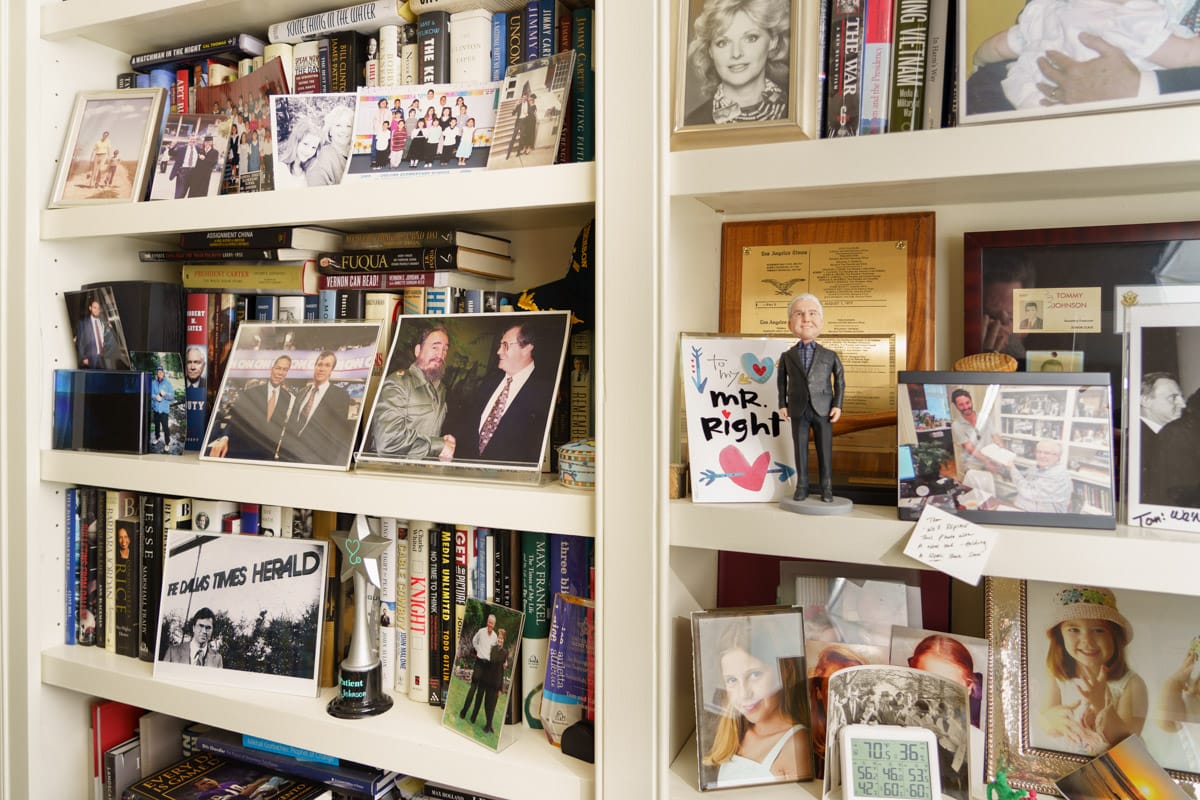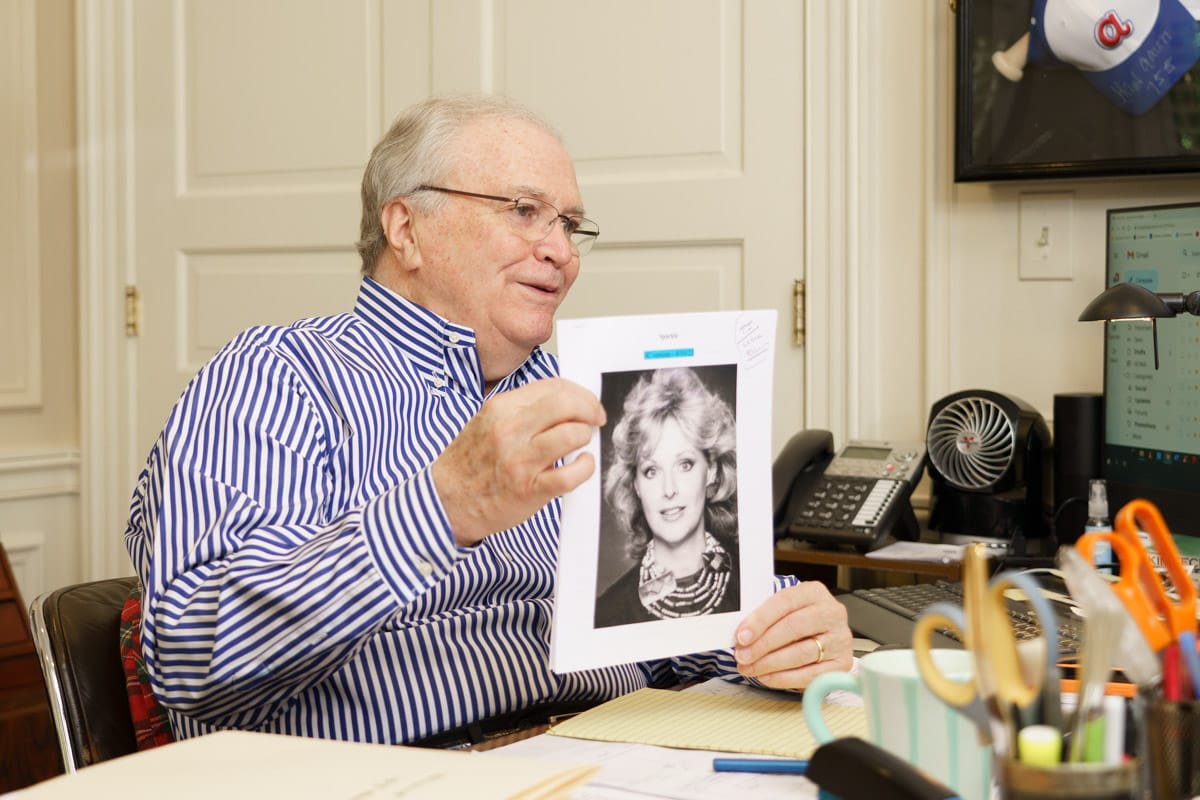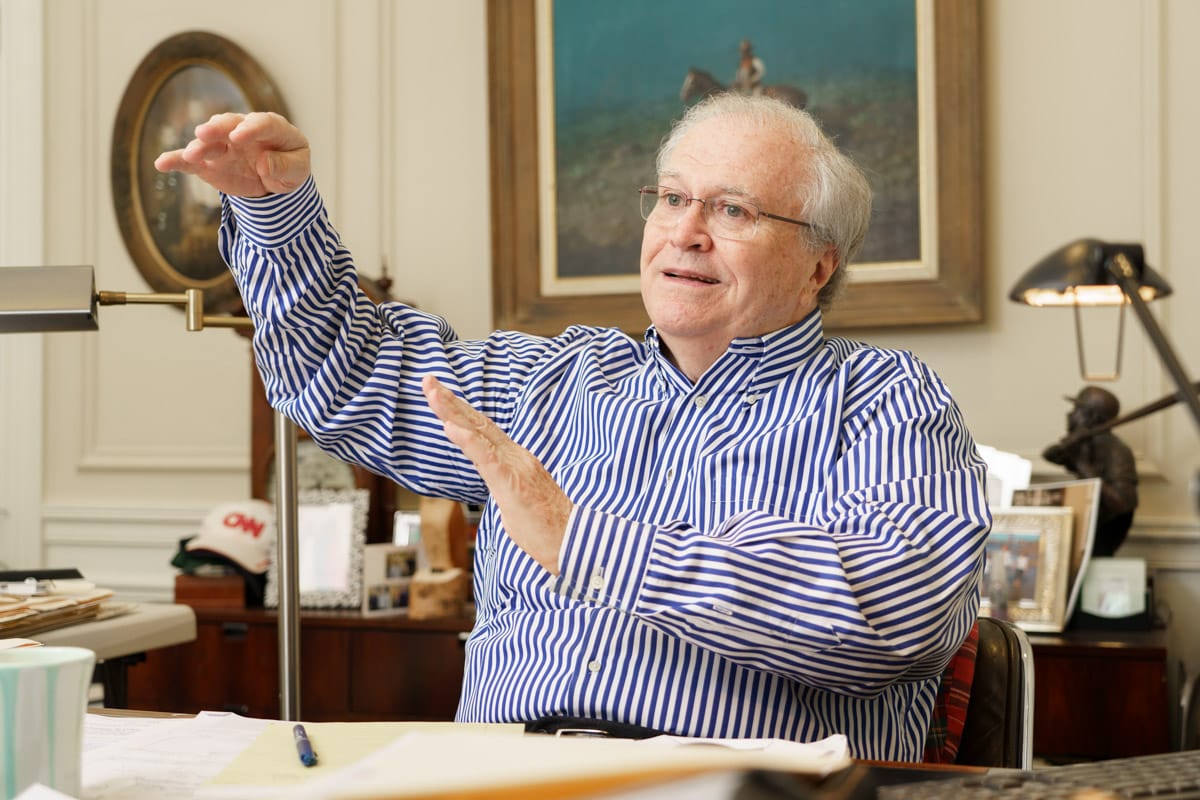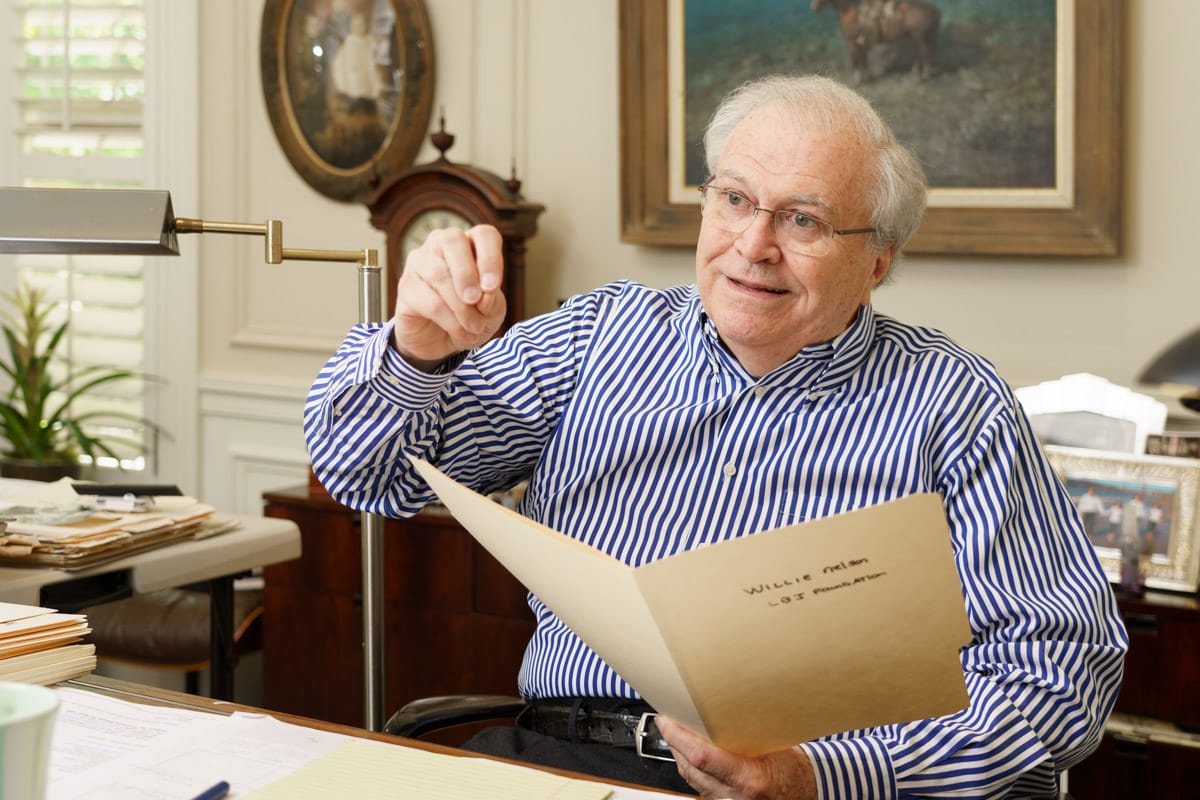Buckhead.com sat down for an exclusive interview with Johnson for his take on being courted by Ted Turner to lead CNN, what drew him to Buckhead, his thoughts on its future, and what keeps him “driven” into his 80’s
The bookshelves lining the office of Tom Johnson’s Buckhead home are practically overflowing with books, eye-catching mementos and photos of the famed journalist with significant world leaders like former President Lyndon B. Johnson, Fidel Castro, and Colin Powell. Johnson, 81, has collected a lifetime of such keepsakes, along with the memories of being in the room for some of the most notable moments in world history over the last six decades.

While working as a White House Fellow during the Lyndon B. Johnson administration, Tom Johnson handed the president a note that Martin Luther King Jr. had been shot in Memphis on April 4, 1968. Johnson was present in 1991 when Mikhail Gorbachev signed his letter of resignation, effectively dismantling the USSR. In fact, Gorbachev’s pen was not working when he attempted to sign the document, so Johnson lent the outgoing USSR president his own pen to ink the resignation that altered the course of world history.
When he wasn’t directly involved, Johnson often played a leading role in sharing information with the world about many significant events of the late 20th century. After working in various roles in the Lyndon Johnson administration, Johnson, who is of no relation to the late president, was named executive director of the Texas Broadcasting Corporation, and later an editor and the publisher of the Dallas Times Herald. In 1977, he took on the role of president and publisher for one of the nation’s most notable publications, the Los Angeles Times. It was Johnson who was on the phone with Walter Cronkite during a live broadcast as the CBS Evening News host informed the nation of LBJ’s passing in 1973 .
Originally from Macon, Georgia, Johnson permanently moved to Buckhead in 1990 after being personally recruited by Ted Turner to serve as president of CNN, the 24-hour news channel that was still a novel foray into disseminating information. From 1990 to until his retirement in 2001, Johnson took on the roles of president, chairman and CEO of CNN, leading the news organization from its relative infancy to prominence, and revolutionizing the way Americans consume news.
Though Johnson retired from CNN over twenty years ago, the self-described “workaholic” is far from finished working. His bookshelves may be packed with mementos, but his desk is very much an active space, filled with manila envelopes and spiral-bound notebooks of the octogenarian’s current projects, including his extensive philanthropic work. He is also enveloped in writing a yet-to-be-named memoir and proudly showcases a notebook garnished with a photo of his wife, Edwina, pronouncing this chapter by far the most important of his memoir.

The move to Buckhead
It was Edwina who located the Johnsons’ Buckhead home when Tom began his tenure at CNN. Johnson said Buckhead “almost marketed itself” with its positive media buzz, abundance of forestation, large lots, great schools, and of course, its convenience to his new workplace.
“Buckhead made a very good impression,” Johnson said.
Johnson’s fondness for Buckhead has endured ever since he and Edwina discovered their home near West Paces Ferry Road more than 30 years ago. Even today, he derives immense pleasure from the sprawling 5-acre property nestled in a forested paradise, complete with a tennis court and a now-vacant chicken coop.
“It’s just right,” he said. “It is beautiful.”
While the original appealing characteristics of Buckhead remain, Johnson said over the last 30 years traffic has become a glaring issue. “More attention” has been given to public safety in the area, although he feels some in Buckhead don’t look at crime statistics outside of the area as closely as they should for comparison. He also feels current Atlanta and Buckhead lawmakers are making positive strides in combating the issue, one of the reasons why he did not support Buckhead becoming its own municipality.
“I’m a strong opponent of breaking away from Atlanta,” he said. “I think it would be devastating for Atlanta Public Schools. I think, over time, it would not be as successful as many of the proponents believe. I’m pleased that the legislature has now voted two times not to proceed on that. I also think the proponents are not as sensitive to the potential damage to Buckhead [a separate municipality would create]. I would prefer for Atlanta and Buckhead to work, as they are today, to build and strengthen rather than trying to blow it up. I’d like to continue to work toward making it a better, stronger city. There’s just so much strong leadership in Buckhead and people who care broadly about Atlanta.”
The birth of cable news
Johnson found his way “back home” to Georgia to lead CNN after being inspired by Ted Turner. The news organization’s founder has the unique distinction of being considered a “genius” by Johnson. According to him, Turner’s ability to generate unique ideas is unparalleled, evident in his creation of a 24-hour news channel, which he later expanded globally, establishing platforms like Turner Classic Movies and CNN Airport. Additionally, he turned the Atlanta Braves into a dynasty club, secured the America’s Cup in 1977, and donated a billion dollars to the United Nations, driven by his belief that the world needed a method for addressing problems without resorting to violent conflict.
“I don’t think there’s ever been somebody quite like Ted, and I doubt there will ever be another one like him,” Johnson said. “I really loved working for him, and I remain very close to him.”

After talking with Turner, Johnson was “convinced the future of television news was CNN.” Johnson quickly had to learn the ins-and-outs of television news given his background primarily focused on print journalism. He was given a crash course when, just a few days into his tenure, then-president George H.W. Bush declared Iraq’s invasion of Kuwait “will not stand.” Johnson approached Turner about the possibility of war, and estimated that up-to-the-minute comprehensive coverage would require the news organization to spend between $5 million and $30 million over its anticipated budget.
“He said, ‘Spend whatever it takes,’” Johnson said.
CNN’s unrivaled coverage of the invasion and subsequent Gulf War helped further cement Johnson into the upper echelon of American journalism, made more impressive by his humble roots.
Modest beginnings
Johnson was born in Macon in 1941 to a financially struggling family. While attending Lanier High School, he took a job as a sports correspondent with the Macon Telegraph following local high school sports teams, reporting on games, and phoning in scores. The experience helped Johnson discover his passion for journalism. He quickly took on other roles under the guidance of more senior reporters and his editors, and later studied journalism at the University of Georgia. While working at the Macon Telegraph, he caught the eye of the newspaper’s owner, Peyton Anderson. When Anderson asked Johnson what he wanted to be, the budding journalist responded that he wanted to be a news publisher, spurring Anderson to make an extremely generous offer.
“He said, ‘in that case, you need to get a Harvard Business School degree’…and he said ‘if you can get in, I’ll pay your way’,” Johnson said. “And I did get in, and he did pay my way.”
While attending Harvard, Johnson returned to Macon for two summers with his new wife Edwina. The two had met at UGA where Edwina had been dating future legendary Auburn University football coach Pat Dye. Johnson jokes that he “prevailed” over Dye to marry Edwina, or as he sometimes calls her, “Sparkle,” based on the Dick Tracy character and Edwina being a “continually happy person.”
“She and I together have shaped our years together,” Johnson said. “There’s been no decision that has been made in all our years together that we haven’t made together.”
That soon became evident in their marriage when Edwina presented Johnson with a New York Times article covering the new White House Fellows program created by LBJ and urged him to apply.
“Now, for quite a while I thought she saw uncommon potential in me, but as much as anything, I think she didn’t want to go back to Macon,” Johnson laughed.
Johnson was accepted into the program, and the experience helped him later become the executive vice president of the media organization owned by LBJ’s family. He spent eight years with the company until it was bought by the parent company of the Los Angeles Times. Johnson wanted to return to his roots in journalism, and L.A. Times publisher Otis Chandler “created a pathway” for Johnson to become an editor and then publisher of the Dallas-Times Herald, and later the publisher and the president of the L.A. Times. He spent 17 years combined with the publications before joining CNN.
“I’ve never seen a plan for anybody quite as specific as the plan [Chandler] outlined for me, giving a young guy a chance to become an editor and publisher in Dallas and to become president and perhaps publisher in Los Angeles,” Johnson said. “But he saw in me, I guess, the potential to rise within his own organization. And I did.”
Johnson credits Chandler as one of several people who helped him carve out his successful career. The first was his mother, who saw her son’s potential and instilled in him an ethic of “work hard and do right” to accomplish anything he set out to do. He also credits Edwina, Macon Telegraph publisher Anderson, former White House Press Secretary Bill Moyers, former President Johnson, and Turner.
Giving back
With such strong influences and those willing to assist Johnson throughout his life and career, he now has turned his attention to helping others.
“I believe as a result of all that’s been done for me that I will do everything I can for others,” he said. “I want to do it privately…but I really want to make sure in my last two ‘innings’ I do as much for others as I can possibly do.”

These ventures include considerable philanthropic efforts, with the Peyton Anderson Foundation, the M.D. Anderson Cancer Center in Houston, Texas, the LBJ Foundation, the Mayo Clinic Foundation, and the Emory Winship Cancer Institute. Johnson has a particular focus on cancer research and treatment — his wife Edwina is a multiple myeloma survivor — and mental health issues, particularly depression and substance abuse. Johnson has been candid about his past struggles with depression, and is a strong advocate for talk therapy, proper mental health diagnosis, and providing advisors to school-aged children and teens at every school, both public and private.
These endeavors continue Johnson’s “workaholic” tendencies, which he says can be a positive attribute, but he “does not recommend” the lifestyle. A significant regret he has is not being more present when his children were young. For that, he is even more thankful for Edwina steering the family ship during those times. Between his extensive volunteerism and as he sets out to pen his memoir, Johnson shows no signs of slowing down.
“I was born driven, and I can’t stop being driven,” Johnson said, perhaps cementing the name for his memoir in the statement.





